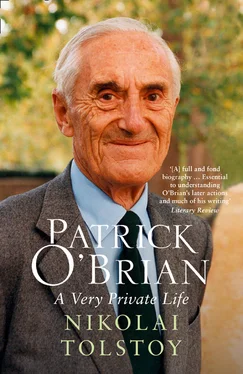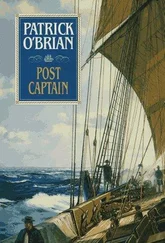This was what Patrick himself enjoyed, observing (at times with binoculars) the world from an inaccessible vantage-point, like the peregrine falcon in his adolescent short story of that title.
Familiar, too, from Patrick’s own experience are the internecine intrigue and feuding which Alain encounters among his family. The Roig family members represent in varying degree a dysfunctional collection, an affliction largely originating in the character of Alain’s deceased uncle: ‘an evil-tempered man, powerful, dom ineering, and restless; a ferocious domestic bully. It was not that Alain blamed his Uncle Hercule then; he accepted him as a force of nature and hated him without forming any judgment.’
All this is too close to Patrick’s experience of his oppressive father Charles Russ for coincidence, and the damaging effect he exerted in varying degrees on his offspring.
Alain’s return to Saint-Felíu arose from a summons to save his cousin Xavier, Uncle Hercule’s son, from what leading members of the family regard as a wholly inappropriate marriage. Alain himself ‘was sorry for Xavier … There was something very moving, in those days, in the sight of that proud, cold young man being humiliated and bully-ragged, and bearing it with a pale, masked fortitude.’
There can be no doubt that Xavier is a figure similarly deriving from Patrick’s character and experience, and the relationship between the dead father and his young son mirrors closely his own experience.
Perhaps the most damaging aspect of the bullying father figure is the way that the distorted relationship repeats itself in succeeding generations. Despite (or rather, because of) his harsh upbringing, Xavier in turn replicates the tyrant in his relationship with his own son Dédé. Although resolved at first to treat the child with the kindness his father never gave him, Xavier grows more and more dissatisfied with the boy, finding him intolerably weak, inadequate and sly. He tries educating Dédé himself, but the child’s foolish frivolity and sullen impertinence goad him into subjecting him to repeated beatings. While acknowledging that he had become the oppressor he so loathed in his father, Xavier confesses himself now incapable of acting otherwise.
This unsavoury episode unmistakably reflects both Patrick’s assessment of his own nature as a child, and his treatment of his son Richard, when he rashly attempted to tutor him in Wales in 1948–49. In this respect the experiment proved miserable for both father and son, as Patrick himself appears to have acknowledged following his arrival in France. What persuaded him to revisit that unhappy time, above all making Xavier excoriate his son in repellently disparaging terms? The explanation is, I suspect, that here as elsewhere Patrick utilized his writing on occasion as means of exorcizing his own shortcomings. He possessed no confidant beyond my mother, and even with her it seems unlikely that he found himself able to enlarge on actions he had come to regard with profound shame. He successively employed his three autobiographical novels ( Three Bear Witness , The Catalans and Richard Temple ) as vehicles for such confessions. The approach was presumably effective, as thereafter he appears to have felt he had effectively exhausted the theme.[fn18]
The extremity of Xavier’s cruelty, and the inadequacy of his justification, are so hyperbolical as to suggest that Patrick expected readers to find the first as repugnant as the second was implausible. I suspect that, by grossly exaggerating his own misconduct, Patrick privately acknowledged it as indefensible. Its function was plainly cathartic. From a biographical point of view, the section in question (chapter IV) should be read in context. Xavier’s savagely frank account of his neglect and ill-treatment of his wife and son is set in the form of a confession, accompanied by expressed desire for absolution. Finding his formal confession to the town priest inadequate, he confides his lack of humanity and consequent fear of damnation to his sympathetic cousin Alain. Alain himself represents an alternative personification of Patrick: the gentle, inquisitive, sage adviser, which is how I for one found him when he confronted problems affecting those close to him. Chapters VIII and IX of The Catalans , recounting events from Alain’s perspective, derive almost verbatim from Patrick’s own experience.
Thus, one underlying function of The Catalans is to provide Patrick’s own confession. More than once in conversation with me he adverted to the Confessions of Jean-Jacques Rousseau, laying sardonic emphasis on the writer’s ingenuous account of his callous treatment of his children. Unsurprisingly, my mother observed that, on completion of Xavier’s bitter self-examination, Patrick found himself emotionally drained. ‘P. finished Chapter IV & got terribly depressed.’[9]
The one person whom Patrick clearly would not have wished to understand the reality behind the father–son divide in The Catalans was his own son Richard. Equally, he must have appreciated the likelihood that the boy would read the book. As has already been seen, he followed his father’s literary career with filial pride. On learning in October 1953 of the book’s completion, he supplied a practical suggestion:
I am very glad to hear that you are having a holiday after completing the book. It seems to me that no sooner is one book out than you have finished another. Instead of writing with your hand why not get a tape machine or some such gadget or would that wreck everything? I do hope it comes out as you would wish it.
Next July, he enquired of my mother:
Has Dad heard anything of the last novel, and what is the title. Over in one shop (bookshop) I was peering round and I heard a customer ask for The Frozen Flame [the title of the British edition of The Catalans ]. It was a terrific thrill to hear that, especially when I know my father wrote it.
His friend Bob Broeder remembers the sensation this aroused at school: ‘Richard brought in a book written by his father, the book was called “The Frozen Flame” by Patrick O’Brian. Richard was very proud of this and the whole class were now more than happy to be associated with a boy whose father was an author.’
As has been seen, once Patrick had renounced the ill-considered scheme of acting as his son’s teacher, a renunciation which coincided with Richard’s arrival at years of discretion, their relationship became unremittingly warm. The boy proved more and more capable of appreciating the literature that Patrick loved. In January 1952 he sent Richard copies of Thackeray’s Henry Esmond and W.H. Hudson’s Green Mansions . It is scarcely conceivable that in 1953 he would have published anything he believed likely to prove wounding to the boy. It seems he was confident that Xavier’s confession would be read purely as a literary construct.
Regarding the element of savage exaggeration in Xavier’s confession, it is further worth considering a linked episode (what Patrick himself terms ‘the parallel disaster’), in which his morbid concern to exaggerate the heinousness of his sin becomes yet more evident. Xavier acquires a dog, which proves disobedient and ill-behaved: so much so, that he thrashes it until he eventually ‘reduced it to a cowering, hysterical, incontinent, useless cur’.[10]
Both Patrick and my mother were fond of dogs, and adored their own Welsh hunt terrier Buddug. In the early summer of 1952, while he was in the midst of writing The Catalans , my mother was obliged to visit England in pursuit of the disastrous Opel car. Always uneasy in her absence, Patrick became increasingly on edge as the days went by, and when after three weeks on the day of her expected return he received a telegram announcing its postponement to the following day, he found himself ‘feeling very much the pathetic poor one and generally angry. Poor Budd chose this one day to be bad, and I whipped her sore.’
Читать дальше












